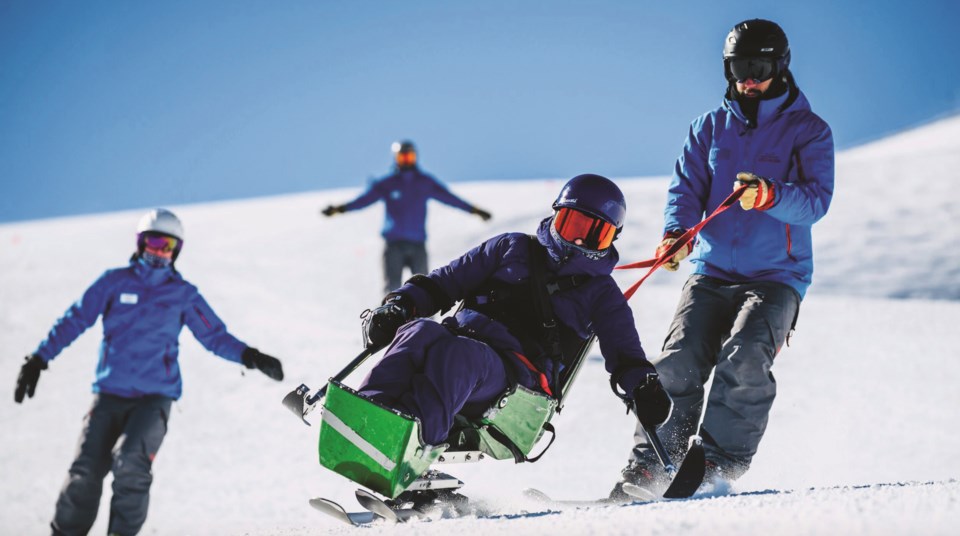Olivia Rey’s first day cruising down Whistler Blackcomb’s slopes in a sit-ski was a memorable one.
It was in December 2016, just over one year after her car flipped on the Sea to Sky Highway, resulting in a life-altering C5/6 spinal cord injury that left the longtime Whistler local unable to use her legs and with only limited use of her arms.
“I had a bunch of my friends and my family as well that came up, and it was very moving for a lot of people, just for me to be able to be back on the slopes, but it was also such a great experience for me … even if it was with a different ability,” she remembered.
Without the Whistler Adaptive Sports Program (WASP), that day might not have been possible.
“It was having the equipment available, but also the support in terms of the coaches and people that know what they’re doing when dealing with somebody that is in a sit-ski,” she explained. “It is hard. I was both a skier and snowboarder prior to my injury, and pretty strong at both of them, and sit-skiing is definitely the hardest one that I’ve tried and am still trying. It’s not something I will ever be able to do independently, I don’t think.”
Rey spends more time on Whistler’s Nordic trails these days, in the cross-country sit-ski she recently purchased with the help of a grant from the High Fives Foundation, and can often be found on summer afternoons kayaking or hitting local bike trails with Whistler Adaptive programs.
This fall, seven years after her injury and six since she became a WASP athlete, Rey officially joined the board of directors of the non-profit society she credits with helping her return to her favourite activities, and to the outdoors.
“It’s just giving back to a foundation that has done so much for me in terms of reincorporating me into sports since I’ve been here,” said Rey. “It’s been good for my mental health that I’ve had something like that here.”
Rey is “a real go-getter,” said WASP executive director Shelley Milstein. “She’s a great ambassador for the program. And you need those people who have been through the program and can really speak to the impact that it has.”
Helping locals and visitors with physical or cognitive impairments access those same benefits is exactly what Whistler Adaptive has strived to do since the organization formed in 1996. Aside from general recreation, “It’s organizations like Whistler Adaptive across the country that are the starting point for [competitive adaptive] skiing, or ski-racing and snowboarding as well,” pointed out WASP vice-president Matt Hallat, a three-time Paralympian who also serves as para-alpine high performance director for Alpine Canada.
After three difficult years hampered by COVID-19 restrictions, Whistler Adaptive is back with a full roster of offerings this winter, from downhill skiing, snowboarding and Nordic skiing to swimming, snowshoeing, and strength and conditioning workouts.
Still, rebounding from the pandemic has “been tricky,” said Milstein. “We lost a lot of volunteer power throughout COVID, either by people leaving Whistler or just becoming disconnected with the program and moving on to something else.”
Corresponding with that drop in capacity was a surge of participants looking to get back to the outdoor activities they love once registration reopened, Milstein continued, “but we were seriously challenged to come up with the human resources, the volunteers and the staff to meet that challenge. And we’re still really struggling with that.”
With another winter season underway, Milstein said Hallat, Rey and the rest of WASP’s staff and board are busy recruiting and training volunteers to help facilitate their programs this winter, while remaining grateful for the grants and individual donations that equally keep the organization afloat.
“We have lots of different [opportunities]. If people want to volunteer on programs, they just need to be excited about helping people access adventure and sports and recreation,” Milstein said. “We provide all the training free of charge. It’s really a pretty simple onboarding process. And if somebody is a wizard at Excel, we have space for them too.”
To learn more about the program or to get involved, reach out to [email protected].




